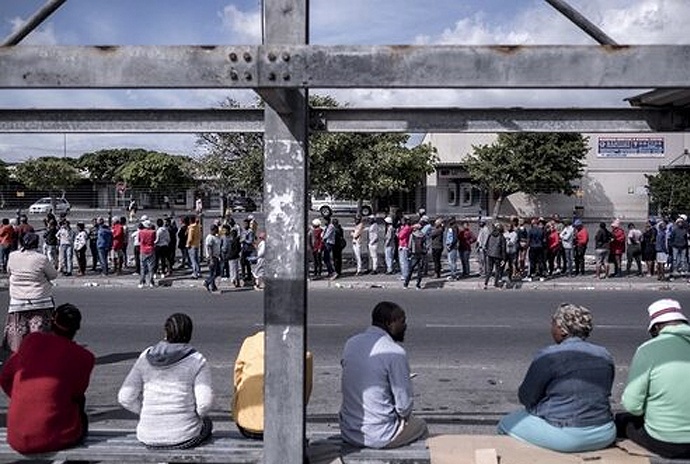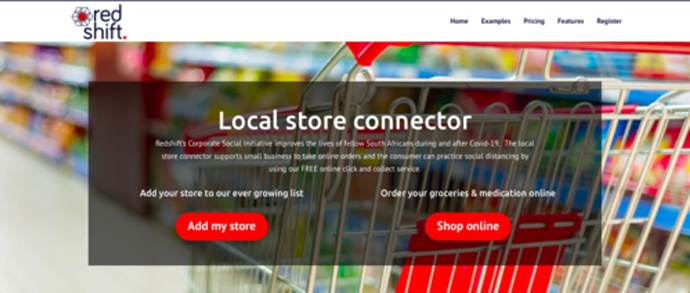Redshift Starts a Fintech Venture During COVID-19 to Support Small Businesses

Shoppers line up outside a supermarket in the township of Khayelitsha. On day nine of the lockdown, there was a two-hour wait to get into the store.
— Tommy Trenchard for NPR
We see this everywhere: People waiting in long lines to shop at large chain stores – and they are shopping in person because those stores do not deliver to the townships. Customers walking past neighborhood shops, not sure if they are open or what they have for sale. The global coronavirus pandemic has made us practice social distancing and caused small businesses to struggle to stay afloat. South Africa shares these disruptions, and Redshift is tackling them.

Mmabatho Mokiti, Redshift's co-founder and USADF youth entrepreneur.
Redshift’s Local Store Connector is connecting consumers to small business owners, and solving a few problems at one time. By being able to order from neighborhood stores and shop closer to home, customers benefit from having more social distancing, food security, and convenience. Small shops signing up with Redshift get a free, online presence, which raises their visibility, lets loyal and new customers know they are open, and facilitates sales.
Why do you start a business during a pandemic? Mmabatho Mokiti, Redshift’s co-founder and USADF youth entrepreneur, was motivated by need and worry. She woke up and found herself in lockdown, with soldiers in the streets and neighbors not certain about how to get basic groceries and stay safe. Mmabatho was concerned about people being able to protect themselves, and about entrepreneurs in her neighborhood with small brick and mortar footprints being able to stay open for safety reasons, even though they were providing essential services.
These insights directly led to Mmabatho and her co-founders, John McDonald and Douglas Hoseck, building Redshift Store Connector and launching it only 3 days after they first discussed the idea in March.
Mmabatho is a mathematician by training and a social entrepreneur by profession -- focused on growing and measuring the impact of corporate social responsibility, improving STEM education, and empowering girls and young women. Now, she is also a fintech entrepreneur.
“I’ve wondered why all the new technologies seem to launch in centralized urban areas, especially in Johannesburg? The township economy is thriving, but tech advancements seem to ignore our marketplace,” Mmabatho observed. Redshift is changing that narrative, as an agile easy-to-use website builder with short turn-around times and a focus on underserved micro-, small- and medium-sized enterprises (MSMEs).

Redshift's Corporate Social Initiative improves the lives of fellow South Africans during and after COVID-19.
How does this work? A local grocery store lists itself and can accept orders from shoppers. These orders can be packed and readied for pickup or home delivery. Redshift provides people with a way to avoid long lines and the risk of getting or spreading infection. Redshift also provides MSMEs with access to e-commerce and the world of digital distribution, with an easy-to-use-interface and the time commitment of just a matter of hours. For the local store connector, a standalone service, this is free; for the website builder, that merely costs the price of a takeaway meal.
Redshift’s impact goes beyond transactional, in both structural and community ways.
First, Redshift helps build the economy by providing an easy way for retail ventures to register their stores, join the formal marketplace and access the local marketplace at no cost. This online entry to registration is significant in South Africa, where over 80 percent of the country’s MSMEs are informal, according to the IFC’s report, The Unseen Sector.
These businesses are creating jobs but are not benefiting from government programs or influencing policies. Becoming formalized, with registration, is one concrete step to growth.
Second, Redshift values communities and is working to maintain and strengthen them. A community is more than an area where people live together. A community in Redshift’s mind is a group of people who care about each other and feel they belong together. This group looks out for one another and puts value on the common good. Being able to walk to the nearby shops, keep money moving locally, and investing in one’s neighbors are core parts of making our communities stronger.
Redshift’s Local Store Connector now is operating in the Johannesburg area, and expanding to other urban areas. The new company has partnered with FinMark Trust, a non-profit focused on “making financial markets work for the poor.” With FinMark and other partners it is developing in the public and private sector, Redshift is speeding up systematic financial sector inclusion and spurring prosperity for more retail ventures and individual customers.
USADF congratulates Mmabatho Mokiti for her quick thinking and entrepreneurial spirit that led her to co-founding Redshift to service her community during these extraordinary and challenging times.

